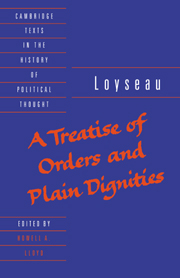Book contents
- Frontmatter
- Contents
- Acknowledgements
- Introduction
- Principal events in Loyseau's life
- Bibliographical note
- Note on translation and citations
- List of abbreviations
- Biographical notes
- Dedicatory epistle: Charles Loyseau to the Honourable Jean Forget
- Preface
- 1 Of order in general
- 2 Of the Roman orders
- 3 Of the order of the clergy
- 4 Of the order of nobility in general
- 5 Of plain gentlemen
- 6 Of the high nobility
- 7 Of princes
- 8 Of the third estate
- 9 Of solemn deprivation of order
- 10 Of the plain dignities of Rome
- 11 Of the plain dignities of France
- Index
- Title in the Series
4 - Of the order of nobility in general
Published online by Cambridge University Press: 05 June 2012
- Frontmatter
- Contents
- Acknowledgements
- Introduction
- Principal events in Loyseau's life
- Bibliographical note
- Note on translation and citations
- List of abbreviations
- Biographical notes
- Dedicatory epistle: Charles Loyseau to the Honourable Jean Forget
- Preface
- 1 Of order in general
- 2 Of the Roman orders
- 3 Of the order of the clergy
- 4 Of the order of nobility in general
- 5 Of plain gentlemen
- 6 Of the high nobility
- 7 Of princes
- 8 Of the third estate
- 9 Of solemn deprivation of order
- 10 Of the plain dignities of Rome
- 11 Of the plain dignities of France
- Index
- Title in the Series
Summary
1. Nature herself has so distinguished between various plants and beasts that in one and the same species some are free and domestic, while others are rustic and wild. As they infallibly retain these qualities in propagating themselves, the wild never beget the domestic, nor vice versa. Further, it is naturally the case that plants and beasts retain the quality of their seed, because their vegetative or sensitive soul proceeds absolutely ‘from the power of matter’, say the philosophers. But the rational soul of men comes immediately from God, Who created it expressly when He sent it into the human body. So it has no natural participation in the qualities of the generative seed of the body where it is relegated.
2. That is why almost all the most admired philosophers and poets astonish me by not attending to this difference of souls. They have deluded themselves that there are certain principles of virtue which are transferred from fathers to children by the act of begetting. Witness the sorites or induction of Socrates who concluded that, as the best-bred apple, wine or horse was the best, so is it with the man of most noble lineage. Aristotle, too, says that all nations honour and esteem nobility because of the likelihood that whoever is excellent is born of excellent parents; and therefore he defines nobility as ‘excellence of birth’, virtue of lineage.
- Type
- Chapter
- Information
- A Treatise of Orders and Plain Dignities , pp. 66 - 81Publisher: Cambridge University PressPrint publication year: 1994

